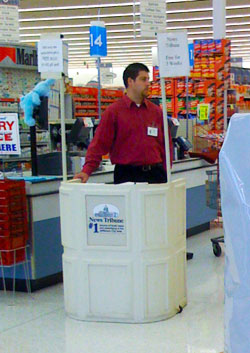Interesting post at AdAge.com on hyperlocal media and how one big media company –in this case NBC– is attempting to play “at the intersection of advertising, marketing and programming, potentially creating new kinds of content in the burgeoning local arena.”
“We’ll explore what the best solutions are to connect across all platforms. Maybe it’s finding a great blogger who lives in that community who becomes an on-air personality. It’s creating things for people to feel more connected to their community.”
“Local media is going to be the intersection of utility and entertainment and everyday life. As things are globalizing, local becomes even more vital. You have the same brands, the same food, etc., wherever you go now. Local is what makes things different; it gets to what people love about their neighborhood, why they decided to live there.”
“You start with an event or something that happens in a small community in one locale and you’re looking at it to amplify out from that. NBC Local is well-placed to help big marketers to put those new kinds of programs in place. You’ll still have people buying local 30-second spots, but more and more also putting together programs that make an impact on a very local level and have that radiate out in significant ways.”
Uh, isn’t this what local broadcasters and newspapers are doing? Or should be doing? Or used to do? Are the Big Guys planning on doing “local” better than local media?
Stay tuned.

 I almost didn’t post this because I don’t want to read anything into the photo. But this young man is soliciting subscribers to
I almost didn’t post this because I don’t want to read anything into the photo. But this young man is soliciting subscribers to